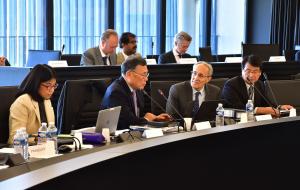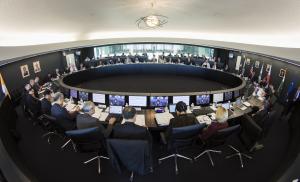Project metrics confirm performance
The governing body of the ITER Organization, the ITER Council, met for the twenty-first time on 15 and 16 November 2017 under the chairmanship of Won Namkung (Korea). Representatives from China, the European Union, India, Japan, Korea, Russia and the United States reviewed a detailed set of reports and indicators covering both organizational and technical performance, and concluded that the project remains on track for success.
In November 2007—ten years ago exactly—the ITER Council convened for the first time in the history of the ITER Organization. Clearing had just begun on the ITER site, the ITER design was under review, and only 170 people were working in temporary offices, housed by ITER's host and neighbour—the CEA Cadarache research centre.
During the two-day meeting, participants confirmed that the ITER Organization and the Domestic Agencies have achieved all Council-approved milestones for 2016 and 2017, maintaining strict adherence to the overall project schedule and critical path. Processes for schedule control, risk management and cooperation also continue to improve, with project performance metrics that now measure physical progress in construction, manufacturing, assembly and installation down to the level of each building system and component.



